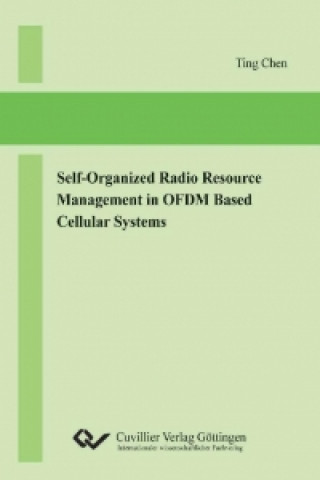
Dostawa
Doradca ds. zakupów
16 126 809 książek w 175 językach







Pokaż wszystkie języki (175)





Jednak się nie przyda? Nic nie szkodzi! U nas możesz zwrócić towar do 30 dni
 Bon prezentowy
O dowolnej wartości
Bon prezentowy
O dowolnej wartości
Bon prezentowy to zawsze dobry pomysł. Obdarowany może za bon prezentowy wybrać cokolwiek z naszej oferty.
Self-Organized Radio Resource Management in OFDM Based Cellular Systems
 Angielski
Angielski
 48 b
48 b
30 dni na zwrot towaru
Mogłoby Cię także zainteresować


The OFDM transmission technique brings high efficiency in future wideband mobile communication systems. With self-organized radio resource management, an OFDM based cellular system can reach full flexibility, especially in a network with hotspots. Each base station allocates resources on demand, based on real-time measurements of signal and interference. Neither a central controller nor direct communication between base stations is needed. Additional schemes can be applied to reduce call interruptions due to unpredictable new interference after resource allocation.Future mobile communication systems require higher data rate and more flexibility. The OFDM, as a multi-carrier transmission technique, achieves high efficiency by subdividing the bandwidth into narrow and orthogonal subcarriers with specific spectrums. The consequent long symbol duration enables also a simple receiver structure in a multi-path propagation environment. Moreover, each subcarrier can use independently individual transmission parameters. In this thesis, a scheme of self-organized radio resource management is proposed for an OFDM based cellular system.All base stations in a cellular network are operating in the same central carrier frequency, but with different radio resources. A resource can be defined as a timeslot, a subcarrier, or any frequency-time block. All resources are accessible at any cell in the cellular network. Neither central controllers nor direct communication between base stations is needed. Each base station allocates radio resources and selects transmission parameters independently in accordance with the requirement and the measured real-time network condition. The powers of signal and interference are measured at both base stations and mobile terminals. To have an interference free measurement, a dedicated signal measurement timeslot is designed in the uplink. A resource quality function is defined to predict the transmission result in a time variant channel, applying both adaptive modulation and coding, and link adaptation. Those resources with highest possible data rates are allocated. In this way, an adaptive and up-to-date resource reuse can be realized.To reduce the amount of droppings due to unpredictable new interference after allocation, a security margin is introduced, which reserves a priori a space for new interference. A suitable margin brings 13% capacity increase. More efficiently, a reallocation procedure can be triggered when service degradation is observed for certain duration. This method can even bring about two times more capacity.The SO-RRM shows its high flexibility in a cellular network with non-uniform or fast changing user distribution. Hotspot cells can declare more resources, while the cells with few users use only much less resources. Furthermore, the multi-user diversity enables in the downlink adaptive resource rearrangement. Resources used inside a cell is exchanged based on instantaneous channel condition. Three different algorithms are compared. They can bring about 80% spectrum higher efficiency.Further information:- Tsinghua University (Chinese)- Tsinghua University (English)- Ruijie Networks Co., Ltd (Chinese)- Ruijie Networks Co., Ltd (English)
Informacje o książce
 Angielski
Angielski




 Jak kupować
Jak kupować





















